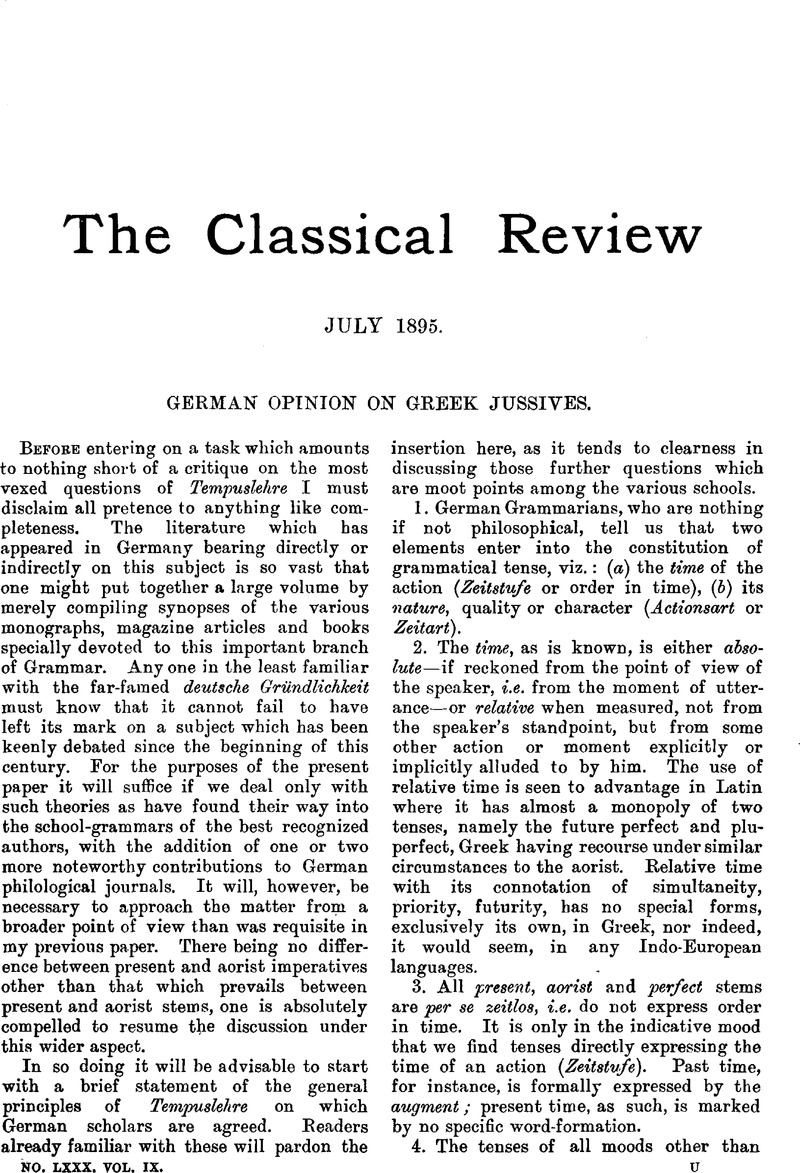No CrossRef data available.
Article contents
German Opinion on Greek Jussives
Published online by Cambridge University Press: 27 October 2009
Abstract

- Type
- Review Article
- Information
- Copyright
- Copyright © The Classical Association 1895
References
page 290 note 1 Owing to the fact that the aor. participle does de facto most frequently refer to past time, exception has been taken to the general rule, no. 4, stated above. See Fox's ‘Rede für die Megalopoliten (page 66): ‘Das Part. Aor.’ lehrt mitanderen Brugmann in seiner gr. Gramm. S. 10 ‘hat nichts von Vergangenheitsbedeutung an sich; diese wird, wo sie vorzuliegen scheiut, nur erst durch die bestimmte Verbindung erzeugt, ist also zufallig.’ Thatsäehlich bezeichnet das Part. Aor. in den allermeisten Fällen eine Vergangenheit, freilich nicht allemal eine (nach dem Zeitpunkte, welcher für den Sprechenden Gegenwart ist, zu bestimmende) absolute (wie in ὁρϙ τὸυποιήσαυτα), sondern sehr häufig eine (nach der durchs Hauptverbum bezeichneten Zeit zu bestimmende) relative, so dass es bald einem Plusquamperf. entspricht. … bald einem einfachen Praeteritum…bald einem Fut. exact…’ The objection here raised meets in my opinion with a satisfactory solution only on the hypothesis—which shall be afterwards insisted on—that the radical idea inherent in the aor. stem is that of ‘concluded action.’ Another objection which occurs to me is the somewhat awkward presence of future infinitives active middle and passive (formed from various stems) side by side with the present, perfect and aor. infinitives. Grammarians seem to confine their attention to the latter. To me such forms as ποιήσειυ, λυθήσεσθαι εἰρήσεσθαι seem to express Zeitstufe. Forms like ποιήσειυ may represent the Actionsart of pres. or aor. stems, while in each case referring apparently to future time. The difficulty which here presents itself is to a certain extent got rid of, partly by reference to Philology which teaches that these forms are Griechische Neubildungen, partly by explaining that their syntactical function is intention not time, at least primarily, as is seen illustrated by the well-known use of the future participle. Other exceptions alleged from Or. obliq. are more apparent than real.
page 290 note 2 Brugmann, from whom much of the foregoing summary is drawn, starts fiom exactly similar first principles, as do also Curtius-Hartel, Kaegi and others. Krüger, who is known to have worked out his theories independently not only of G. Curtius' leading, but of that of all his other contemporaries, has nevertheless in this matter arrived at practically identical results. Difference of opinion manifests itself in settling the various stem functions.
page 290 note 3 This seems to me preferable to the word Zeitart which is used as synonymous—less accurately, as I think, inasmuch as the stem function is not a quality of time or of tense but rather a quality of action.
page 290 note 4 Philipp Buttmann's Griechische Grammatik, herausgegeben etc. von Buttmann, A. (Berlin 1854), 19 ed. § 137. 5. So also in other earlier and later editions.Google Scholar
page 291 1 ‘Praeseus enim et aoristus in caeteris praeter indicativum modis eo maxime differunt, quod praesens rem diutius durantem vel saepius repetitam, aoristus rem brevi absolutam aut semel factam indicat. Inepte dicas γράψου βίβλου quia hoc longi temporis opus est: recte vero δὸς τὴυχει̂ρα quia hoc brevi temporis momento fit. Exemplis nihil opus, quum utique obvia sint. Explicatius disserui de hac re in Censura tertiae editionis grammaticae Buttmannianae in diar. litter. Lips. a. 1805 m. mart, n. 59 col 617. s., adscivitque postea hanc rationcm Buttmannus et exposuit in gram. gr. § 124.’ Opus supra citatum. Lipsiae 1822 adnot. 165 b ad pag. 215.
page 291 note 2 Kühner, R, Ausführliche Grammatik der Griechischen Sprache. Hannover 1834—35. 1 Auflage.Google Scholar
page 291 note 3 Griech. Gr. § 110 page 150. second ed.
page 291 note 4 Hartel, Curtius's Griech. Schulgramm. 19 ed. 1890. § 193—198Google Scholar
page 291 note 5 Krüger, K. W., Griech. Sprachlehre für Schulen, 5 ed. Syntax § 53.Google Scholar
page 291 note 6 Kaegi, Ad, Griech. Schulgr. second ed. 1889. § 181, cf. § 188, 189.Google Scholar
page 292 note 1 The reference referred to contains perhaps only an obiter dictum; see note further on.
page 292 note 2 The same occurs in several school-grammars, e.g. Goldbacher § 387 (fifth ed.). This author does not however use the word dauernd, adopting instead the term sich entwickelnd, and in so far is in advance of the theory we are now discussing. As regards the Latin Syntax the authors referred to differ in many matters of detail. Compare for instance the various views put forward by Lattmann, N. J. B.2 1892, page 132 sq., Waldeck, N. J. B. 1890, page 379, Landgraf in Anmerk. zu den Vorlesungen von Reisig-Haase, N. 448 and 448a, and Wetzel in Beiträge zur Lehre von der Consec. temp. im Latcinischen.
page 292 note 3 Curtius, G., Erläuterungen zu meiner griech. Schulgr. 8 Aufl. page 182.Google Scholar
page 292 note 4 This is a return to the familiar idea of ‘momentary action.’
page 292 note 5 Cf. Krit, Krüger's. Anal. 1, page 159 and Stud. 2, page 128.Google Scholar
page 292 note 6 This ambiguity has not escaped the notice of German scholars. Koch in the earlier editions of his Grammar for greater clearness makes use of two words, e.g. 8 Aufl. § 100. 1 ‘Der Konj. Optat. etc. des Aor. bezeichnen die Handlung schlechthin (faktische Bedeutung), häufig speciell das Eintreten der Handlung (ingressive Bedeutung) ohne alle Angabe der Zeit.’
page 293 note 1 The doctrine stated above is not in contradiction with Brugmann's teaching—that the various stem formations originally served to denote not mere differences in the quality of an action but absolutely different shades of meaning. Cf. Griech, Brugmann. Gr.2 § 155, page 184.Google Scholar


